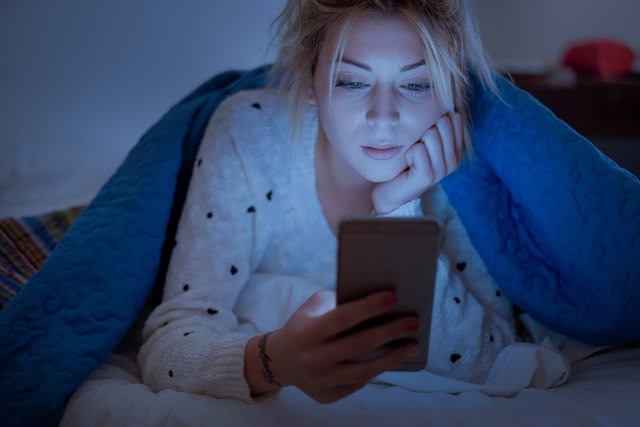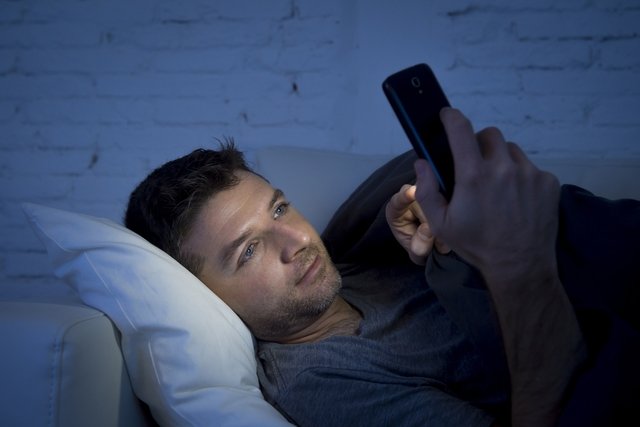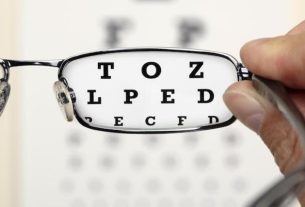Using your cell phone at night, before going to sleep, can cause insomnia and reduce the quality of sleep, and also increase the chances of depression or high blood pressure. This happens because the light emitted by electronic devices is blue, which stimulates the brain to remain active for longer, preventing sleep and disrupting the biological sleep-wake cycle.
Furthermore, several studies show that blue light can also accelerate skin aging and stimulate pigmentation, especially in darker skin.
But it’s not just the cell phone that emits this bluish light that harms sleep, any electronic screen has this same effect, like the TV, the tablet, the computer, and even fluorescent lights that are not suitable for indoors. Therefore, ideally, screens should not be used before going to sleep, or for at least 30 minutes before going to sleep and it is also recommended to protect the skin throughout the day.

Main health risks
The main risk of using electronic screens before bed is related to difficulty falling asleep. Thus, this type of light may be capable of affecting the human being’s natural cycle, which, in the long term, may result in a greater risk of developing health problems, such as diabetes, obesity, depression, high blood pressure or arrhythmia.
1. Insomnia
Almost all colors of light can affect sleep, as they reduce the production of melatonin, which is the hormone responsible for helping you fall asleep at night. However, blue light, which is produced by almost all electronic devices, appears to have a wavelength that affects the production of this hormone more, reducing its quantity for up to 3 hours after exposure.
Therefore, people who are exposed to light from electronic devices until a few moments before going to sleep may have lower levels of melatonin, which can cause difficulty falling asleep and even difficulty maintaining quality sleep.
2. Eyestrain
Frequent exposure to blue light can cause greater eye fatigue, as it is more difficult to focus with blue light and, therefore, the eyes need to constantly adapt. Thus, due to tired eyes, it is also possible to experience eye pain, redness, tearing and itching, for example.
3. Skin problems
Blue light contributes to skin aging because it penetrates deeply into all layers, causing the oxidation of lipids, consequently leading to the release of free radicals, which damage skin cells.
In addition, blue light also contributes to the degradation of skin enzymes, which results in the destruction of collagen fibers and a reduction in collagen production, making the skin more aged, dehydrated and prone to pigmentation, leading to the appearance of blemishes, especially in people with darker skin.

What to do
To avoid the risks of blue light, it is recommended to take some precautions such as:
- Install applications on your cell phone which allow the luminosity to be changed from blue to yellow or orange;
- Avoid using electronic devices for up to 2 or 3 hours before sleep;
- Prefer warm yellow lights or reddish to light up the house at night;
- Wear glasses that block blue light;
- Put on a screen protector on cell phones and tablet, that protects from blue light;
- Wear face protection that protects against blue light, and that has antioxidants in its composition, which neutralize free radicals.
Furthermore, it is also recommended to reduce the use of these devices, especially around 30 minutes before bed.
Bibliography
- NAKASHIMA, Yuya et. al.. Blue light-induced oxidative stress in live skin. Free Radical Biology and Medicine. 108. 300-310, 2017
- Mr. Falcone and al.. Effects of blue light on inflammation and skin barrier recovery following acute perturbation. Pilot study results in healthy human subjects. Photodermatol Photoimmunol Photomed. 34. 3; 184-193, 2017
- HETTWER, Stefan, et. to the.. Blue light protecting cosmetic active ingredients: a case report. Journal of Dermatology & Cosmetology. 4. 1; 94-97, 2017
- TOSINI, Gianluca et al.. Effects of blue light on the circadian system and eye physiology. Molecular vision. Vol.22. 67-68, 2016
- CHI, Heng-Yu. Effects of Screen Light Filtering Software on Sleep and Morning Alertness. Master’s Thesis, 2017. Central Washington University.

Sign up for our newsletter and stay up to date with exclusive news
that can transform your routine!
Warning: Undefined array key "title" in /home/storelat/public_html/wp-content/plugins/link-whisper-premium/templates/frontend/related-posts.php on line 12
Warning: Undefined array key "title_tag" in /home/storelat/public_html/wp-content/plugins/link-whisper-premium/templates/frontend/related-posts.php on line 13



